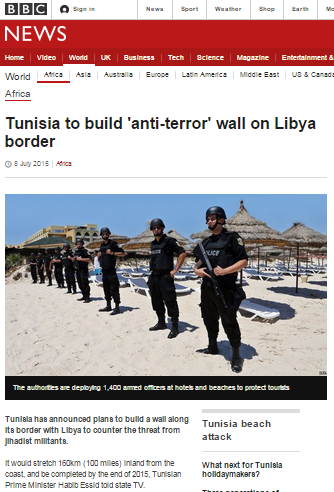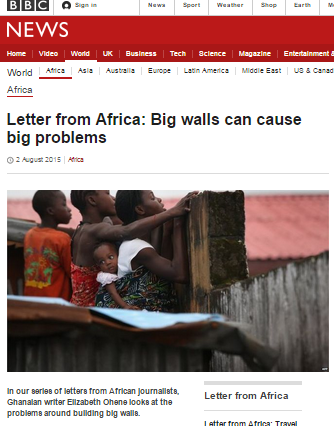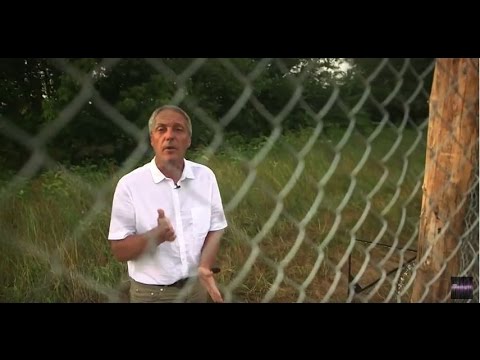Recent weeks have seen the appearance of a relatively large volume of BBC reports relating to the subject of fences.
A 175 km-long fence being constructed along the Hungarian-Serbian border with the aim of keeping migrants and asylum seekers out of Hungary has been the topic of several BBC reports – written and filmed.
“…it’s an ugly reminder of the Iron Curtain that used to divide Europe from east to west. […] The government’s out to send a double message: to prospective asylum seekers – stay away; there’s no place for you here. And to the Hungarian tax payer – we will pull out all the stops to protect you from the foreign hoards.”
Decidedly less polemic language is seen in BBC reports concerning the British government’s £12 million investment in fencing and other security measures in Calais – also with the aim of keeping migrants out of their country. Interestingly, fact that the UK is paying for fence construction on French soil does not appear to be an issue and insinuations of racism as a factor influencing the British approach to the issue of migrants do not appear in the way they frequently do in BBC coverage of the topic of African migrants in Israel.
Last month the Tunisian government announced a plan to construct a 160 km-long barrier along its border with Libya as part of its counter-terrorism strategy. Notably, the BBC News website article informing audiences of that news portrayed the reason for the construction of that barrier in clear terms. Originally titled “Tunisia to build Libya wall to counter terror threat” and now going under the headline “Tunisia to build ‘anti-terror’ wall on Libya border“, the article opens:
“Tunisia has announced plans to build a wall along its border with Libya to counter the threat from jihadist militants.
It would stretch 160km (100 miles) inland from the coast, and be completed by the end of 2015, Tunisian Prime Minister Habib Essid told state TV.
The Tunisian army would build the wall, which would have surveillance centres at certain points along it, Mr Essid said.”
In contrast with the terminology regularly used to portray Israel’s anti-terrorist fence, the BBC does not qualify the structure’s aim with “Tunisia says” and obviously did not find it necessary to ‘balance’ the Tunisian government’s description of the wall’s purpose with input from the terrorist organisations it aims to thwart. Insofar as we are aware, the BBC has also not found it necessary to issue its journalists with a ‘style guide’ instructing them on the approved terminology for this barrier or any of the others above in order to “avoid using terminology favoured by one side or another in any dispute“.
However, despite that factual portrayal of the Tunisian government’s plan, audiences were also provided with an opinion piece titled “Big walls can cause big problems” from a person with no apparent qualifications on the subject of counter-terrorism. The messaging in that article is very clear.
“In our series of letters from African journalists, Ghanaian writer Elizabeth Ohene looks at the problems around building big walls. […]
But more often than not, and if you are a country instead of a person, you can’t move and so you try to find ways to keep out the unpleasantness.
And so we build walls. But then walls can cause more trouble than they solve. […]
We build walls to divide and keep out and therein lies the problem.[…]
There is nothing in history that would lead us to believe that the highest walls can keep out unwanted people or keep in people who want to get out.”
That article includes an insert presented under the subheading “Great divides: Past and present” and its first entry reads:
“Israel began building barrier in and around the occupied West Bank in 2002: 720km planned by completion”
As is all too often the case in BBC coverage, readers are not told why Israel reached the decision to build that fence and its record of preventing what Ms Ohene coyly describes as “unpleasantness” is concealed. Had it not been, her claim that “[t]here is nothing in history that would lead us to believe that the highest walls can keep out unwanted people” would have been considerably less convincing.
In May of this year the IDF published figures relating to the anti-terrorist fence’s efficacy. Since the fence’s construction, suicide bombings have decreased by 100% and shooting attacks by 93.5%, bringing a dramatic fall in the number of Israeli civilians killed by terrorists. Unfortunately for members of the BBC’s audience trying to put both the Israeli security barrier and similar measures in other countries into context, that information is not included in the BBC narrative on the subject.
Related Articles:
Does BBC reporting on Israel’s anti-terrorist fence meet standards of ‘due impartiality’? – part 3





